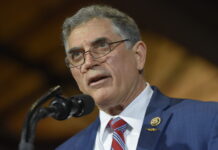
(Georgia Recorder) — Today is the last day to register to vote in the June 17 primary to fill two Georgia Public Service Commission seats on an embattled board that has faced criticism for a series of Georgia Power rate hikes over the last several years.
Winners of the upcoming primaries will face off in November to determine who will serve on the five-member charged with regulating a number of telecommunications, electricity and natural gas services across the state. The winners will serve on a board that has approved six utility rate increases since 2023 for Georgia Power customers.
This year’s primary and general elections will mark the first time since 2020 PSC contests have appeared on Georgia ballots following lawsuits challenging redistricting and the fairness of the PSC election process for Black voters. Typically, the terms of the five commission districts are staggered over a six-year period.
The 2025 PSC early voting period for the primary election will be held from May 27 to June 13.
If no candidate receives 50% of the vote in the June 17 election, a runoff election will be held on July 15.
Georgians can find information about registering to vote and more about elections on the Georgia Secretary of State’s My Voter Page.
Currently, Republican incumbents Tim Echols and Fitz Johnson are facing challengers seeking to upset their bids to remain on the board. The other three members of the board are also Republicans.
Echols, who is seeking his third term on the PSC, will face challenger Lee Muns in the Republican primary for the commission’s District 2 seat. Whoever wins will go on to face Alicia Johnson of Savannah, the sole candidate for the Democratic Party.
Although the commissioners must reside in the geographical district that they represent, every Georgia voter can determine the winner since the state regulators are elected statewide.
There is a large field of candidates for the metro and suburban Atlanta area represented by Johnson, who is seeking re-election after being appointed by Gov. Brian Kemp to fill a vacancy in 2021.
One of the Democratic candidates is Daniel Blackman, who served as a regional administrator for the Environmental Protection Agency under President Joe Biden, and went to a run-off against incumbent Lauren “Bubba” McDonald in the 2020 Public Service Commission election.
The District 3 Democratic primary also includes Keisha Waites, a former member of the Atlanta City Council and the Georgia House of Representatives, as well as Peter Hubbard, founder of Center for Energy Solutions who has been an expert witness at PSC hearings, and Robert Jones, who has had a career involved in energy regulation in California.
The Atlanta Journal-Constitution reported Friday that a residency challenge has been filed against Blackman after he moved into the PSC district one day before the deadline for candidates.

Since the start of 2023, the average Georgia Power residential customer is paying about $43 more to cover base electric rate increases, recover excess fuel expenses, and cover the cost of completing two nuclear power generators at the Plant Vogtle expansion.
The Southern Company subsidiary serves about 2.7 million customers and is the state’s largest supplier of electricity.
Georgia Power’s 2025 resource plan details the company’s ambitious energy deployment goals for the next decade, including accelerated plans to add both fossil fuel and clean energy sources.
Georgia Power projects that over the next decade the growth of data centers will significantly increase the state’s electricity consumption. The proliferation of data centers has become a source of consternation for a number of consumer and environmental watchdogs.
There has been some optimism among Republican members of the PSC that the new federal administration under President Donald Trump will curb inflation and stabilize some of the high electricity bills Georgians pay. Additionally, they stated that they supported efforts to increase solar production and usage in the state.
Georgia isn’t the only state with customers frustrated about rising utility costs. Consumer education nonprofit PowerLines and the polling company Ipsos conducted a nationwide survey in March that revealed 73% of 2,000 respondents were concerned about rising energy prices.
“The results held consistent across the political spectrum, with Republicans, Democrats, and Independents alike expressing similar levels of concern,” the report said.
However, 90% of respondents could not identify the name of the state regulator that oversees gas and electric bills.







